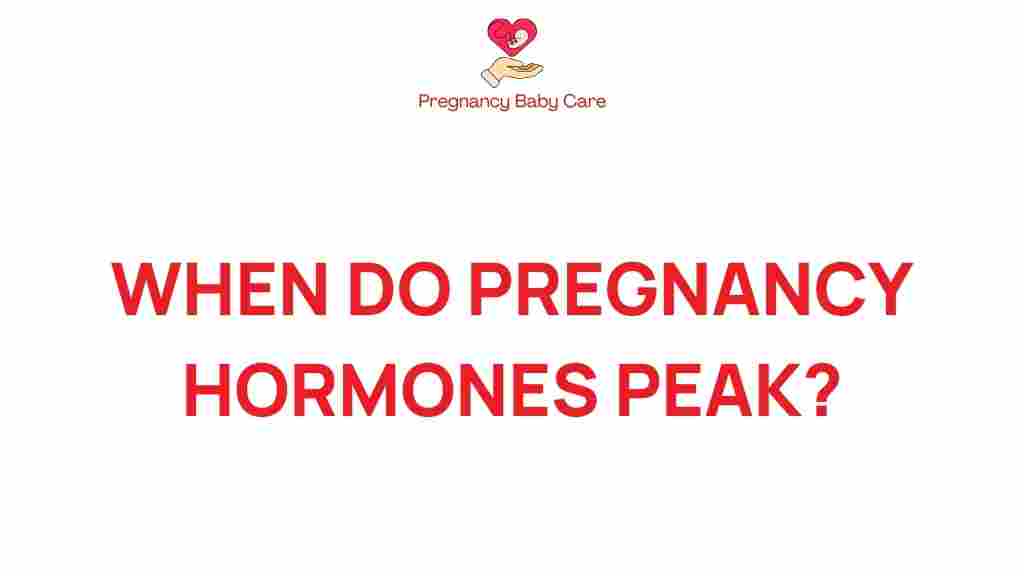Unraveling the Mystery: When Do Pregnancy Hormones Peak?
Understanding the timeline of pregnancy hormones is essential for expectant mothers. Hormones play a critical role in maternal health, fetal development, and the overall pregnancy journey. In this article, we will delve into the peaks of pregnancy hormones throughout the pregnancy timeline, how they affect your body, and what symptoms you might experience.
1. The Role of Pregnancy Hormones
Pregnancy hormones are crucial for maintaining a healthy pregnancy and supporting fetal development. These hormones include:
- Human Chorionic Gonadotropin (hCG): This hormone is produced shortly after conception and is essential for maintaining the corpus luteum, which produces progesterone during early pregnancy.
- Progesterone: Known as the “pregnancy hormone,” progesterone helps to prepare the uterus for implantation and maintains the uterine lining throughout pregnancy.
- Estrogen: This hormone increases significantly during pregnancy and is vital for fetal development, blood flow, and preparing the body for labor.
- Relaxin: This hormone helps to relax the ligaments in the pelvis and soften the cervix in preparation for childbirth.
2. Understanding the Pregnancy Timeline
Pregnancy is generally divided into three trimesters, and each trimester has its unique hormonal changes and peaks.
First Trimester (Weeks 1-12)
The first trimester is characterized by rapid hormonal changes:
- hCG: This hormone peaks around 8-11 weeks of pregnancy, which is why many pregnancy tests detect it during this timeframe.
- Progesterone: Levels begin to rise shortly after conception, peaking at about 10-12 weeks. This increase helps maintain the pregnancy and prevent contractions.
- Estrogen: Estrogen levels also rise, peaking towards the end of the first trimester, contributing to breast tenderness and other early pregnancy symptoms.
Second Trimester (Weeks 13-26)
During the second trimester, hormone levels stabilize, but significant changes still occur:
- Progesterone: While levels continue to rise, the rate of increase slows down. This hormone remains essential for sustaining the pregnancy.
- Estrogen: Estrogen levels continue to rise throughout the second trimester, peaking around 26 weeks, playing a critical role in fetal development and preparing the body for labor.
Third Trimester (Weeks 27-40)
In the third trimester, pregnancy hormones prepare the body for childbirth:
- Progesterone: Levels remain high to prevent preterm labor and continue supporting the pregnancy.
- Estrogen: Estrogen continues to rise and peaks just before labor, promoting uterine contractions and preparing the breasts for breastfeeding.
- Relaxin: This hormone increases towards the end of pregnancy, helping to soften the cervix and relax the pelvic ligaments.
3. Key Pregnancy Symptoms Associated with Hormonal Changes
As pregnancy hormones fluctuate, various symptoms may arise:
- Nausea and Vomiting: Often referred to as morning sickness, this is commonly experienced in the first trimester due to rising hCG and progesterone levels.
- Fatigue: Increased levels of progesterone can lead to feelings of tiredness, especially in the first trimester.
- Breast Changes: Hormonal changes lead to breast tenderness and growth, particularly due to rising estrogen and progesterone levels.
- Mood Swings: Fluctuating hormones can impact mood, leading to emotional highs and lows.
- Increased Urination: Higher levels of hormones and increased blood flow to the kidneys can lead to more frequent trips to the bathroom.
4. Hormonal Changes and Maternal Health
Monitoring hormonal changes is vital for maternal health. Abnormal levels of pregnancy hormones can indicate potential issues:
- Low hCG Levels: May suggest an ectopic pregnancy or miscarriage.
- High hCG Levels: Could indicate multiples (twins or triplets) or gestational trophoblastic disease.
- Progesterone Deficiency: May lead to a risk of miscarriage or premature birth.
5. Troubleshooting Tips for Managing Hormonal Changes
Expectant mothers can take several steps to manage the symptoms associated with hormonal changes:
- Stay Hydrated: Drinking plenty of fluids can help alleviate nausea and fatigue.
- Nutrition: A balanced diet rich in fruits, vegetables, whole grains, and lean proteins supports overall health and fetal development.
- Rest: Prioritize rest to combat fatigue and stress.
- Exercise: Light exercise, such as walking or prenatal yoga, can boost mood and energy levels.
- Consult Your Healthcare Provider: Regular prenatal check-ups can help monitor hormone levels and address any concerns.
6. Conclusion: Embracing the Journey of Pregnancy Hormones
Understanding when pregnancy hormones peak is crucial for managing the pregnancy timeline effectively. As hormones fluctuate, they influence maternal health, fetal development, and various pregnancy symptoms. By staying informed and proactive, expectant mothers can embrace their pregnancy journey with confidence.
For more information on pregnancy and maternal health, check out this comprehensive guide. Additionally, if you’re looking for expert advice on managing hormonal changes during pregnancy, consider visiting this external resource.
Remember, each pregnancy is unique, and if you have any concerns about your symptoms or hormone levels, consult your healthcare provider for personalized advice.
This article is in the category Pregnancy and created by PregnancyBabyCare Team
